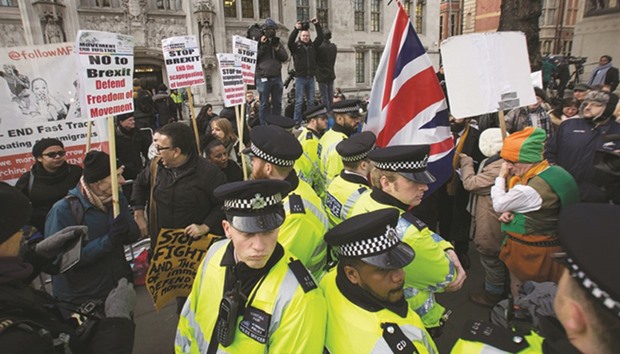The Supreme Court yesterday opened a four-day hearing of the government’s appeal against a ruling that parliamentary approval is needed before Prime Minister Theresa May can begin negotiations with the European Union on Brexit.
Many legal analysts expect the nation’s highest court to uphold last month’s ruling by the high court, which campaigners hailed as a victory for parliamentary democracy.
Lawyers for the plaintiffs, led by investment fund manager Gina Miller, successfully argued that May does not have the authority to use an ancient legal privilege to justify her decision to start Brexit negotiations without a parliamentary vote.
At the start of yesterday’s hearing, the court’s president, David Neuberger, warned observers against divulging personal information about the participants after Miller and others received extensive online abuse and death threats.
The 11 judges were “aware of the strong feelings” on the political implications of the case but “those wider political questions are not the subject of this appeal,” Neuberger said.
He said the live-streaming of the appeal was “very important aspect of open justice.”
The high court said the government did not have power under the crown’s prerogative to trigger Article 50 of the Lisbon Treaty, which sets the rules for a two-year negotiating process for a nation leaving the EU.
May has said she still plans to trigger Article 50 by the end of March.
She has argued that she was given a sufficient mandate through a referendum in June, when 52% opted to leave the EU.
Earlier the attorney general Jeremy Wright said the government’s appeal to the Supreme Court goes to the heart of the British constitution.
“It raises issues going to the very heart of our constitutional settlement,” Wright told the court.
Earlier Prime Minister Theresa May’s spokeswoman yesterday stressed that the government wants to provide certainty over its exit from the European Union by saying there is no going back once divorce talks have formally begun.
“While others...make clear that they want to frustrate the will of the British people by slowing down the process of leaving and trying to tie the government’s hand in a negotiation, the government is getting on with respecting what the British people decided,” she said when asked about the opposition Labour Party’s pledge to amend any Article 50 bill.
“Most people want certainty...We are seeking to provide certainty where we can by saying; one — we will trigger Article 50 by the end of March; two, (being) very clear — there will be no going back,” she told reporters.

Police officers stand between pro and anti-Brexit demonstrators outside the Supreme Court building in London yesterday.
